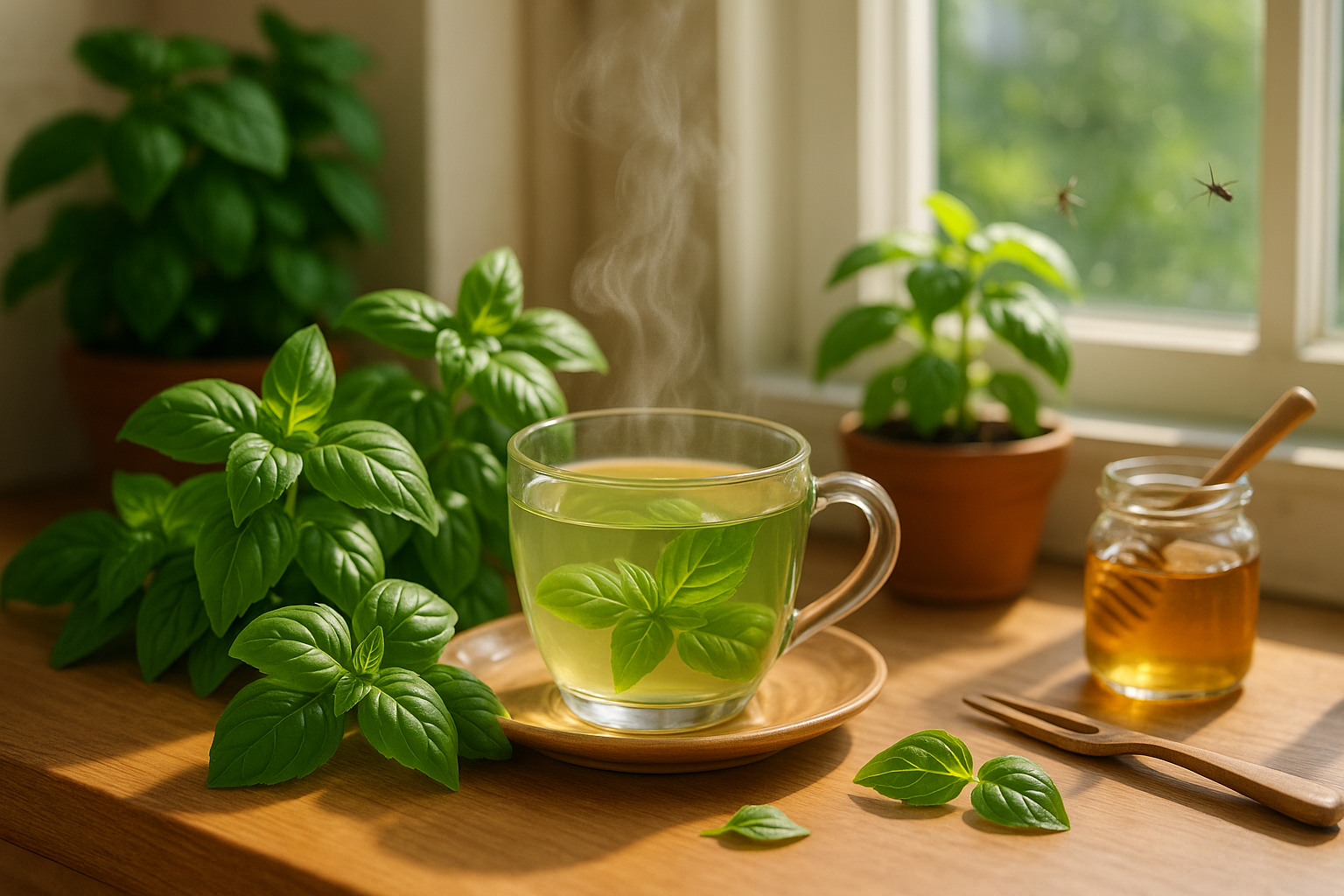Introduction to Basil Tea
Basil tea benefits have become a hot topic in wellness circles—and for good reason. This soothing herbal brew is much more than just a comforting beverage. Whether made from sweet basil, commonly found in kitchens around the world, or holy basil (known as tulsi in India), basil tea has earned a reputation for its unique flavor and impressive health perks.
Both varieties bring their own subtle notes and wellness properties to your cup, offering something for every palate and need. While you might usually associate basil with pasta sauce or pesto, steeping its leaves in hot water unlocks a gentle, aromatic drink that blends tradition with modern healthy living.
More people are now making basil tea at home, drawn by its antioxidant, anti-inflammatory, and calming qualities. From easing stress to supporting digestion, basil tea is quickly moving from grandmother’s remedy to an everyday favorite.
In this article, we’ll walk you through exactly how to make basil tea—no fancy equipment needed—and break down the science-backed basil tea benefits you can enjoy. Whether you’re new to herbal teas or looking for a fresh addition to your morning ritual, you’ll find practical advice for making and enjoying this ancient yet ever-trendy drink.
How to Make Basil Tea at Home
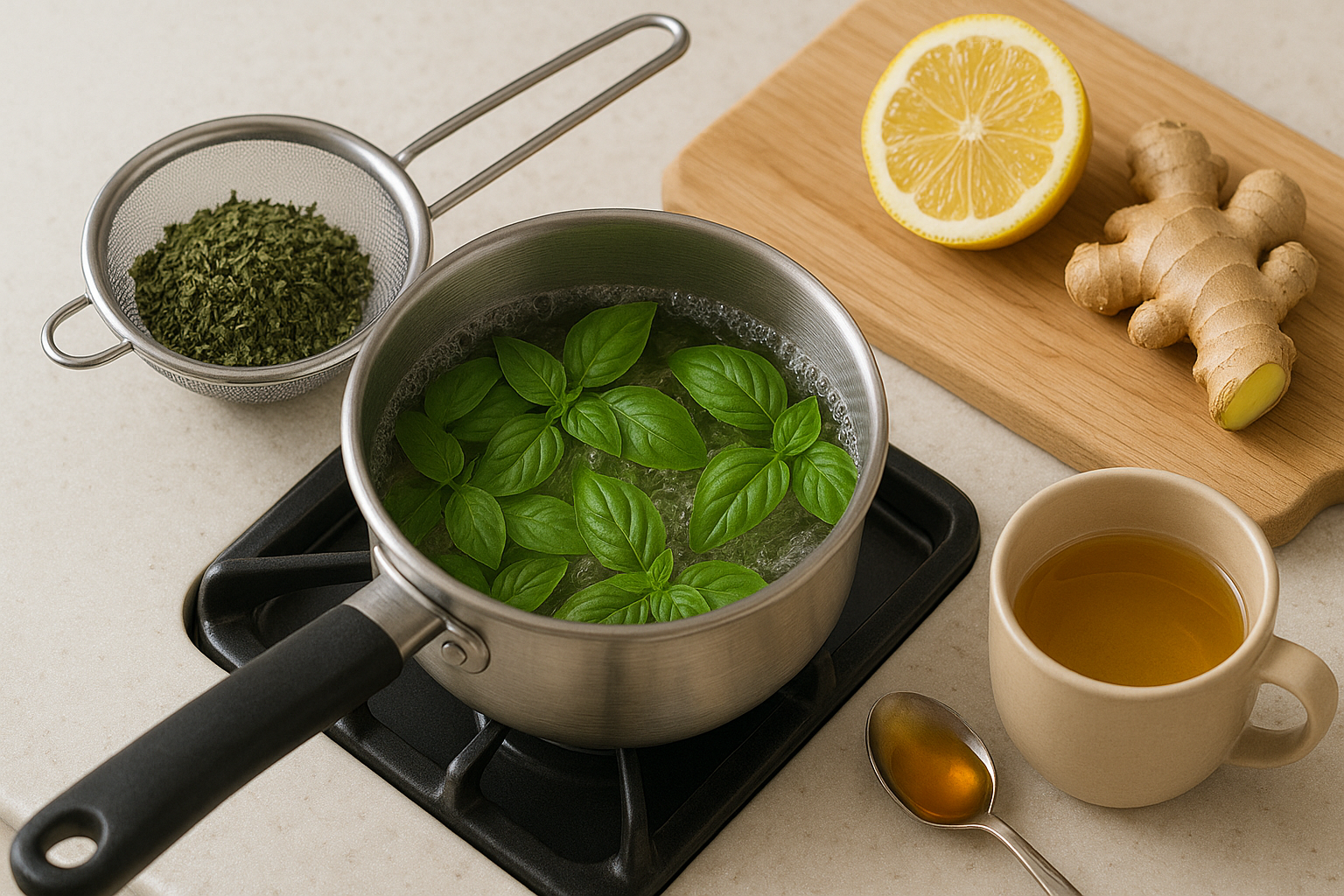
Making basil tea at home is easy and refreshing, whether you’re using fresh basil leaves or dried basil. For fresh basil tea, you’ll need 1 cup of fresh basil leaves (washed and gently torn), 2 cups of water, a small pot or kettle, and a strainer. For dried basil tea, substitute with 1 tablespoon of dried basil.
Begin by bringing the water to a gentle boil in your pot. If using fresh basil, add the leaves directly to the water, turn off the heat, and cover to steep for 5 to 7 minutes. For dried basil, add the dried herb, let it steep for 5 minutes, then strain out the leaves.
To elevate your basil tea, try adding a slice of fresh ginger during steeping for warmth, or a wedge of lemon for brightness. A spoonful of honey stirred in just before drinking adds soothing sweetness.
For a more robust flavor, lightly crush or bruise the basil leaves before steeping to release their essential oils. Letting the tea steep a minute longer intensifies the taste, but don’t oversteep, as basil can become bitter.
Serve your basil tea hot, or cool it down and pour over ice for a refreshing summer drink. You can also blend basil with other herbal teas, like mint or chamomile, to explore new flavors.
Whether you’re winding down or need a gentle pick-me-up, homemade basil tea is quick, tasty, and endlessly customizable with just a few pantry staples.
Nutritional Profile of Basil Tea
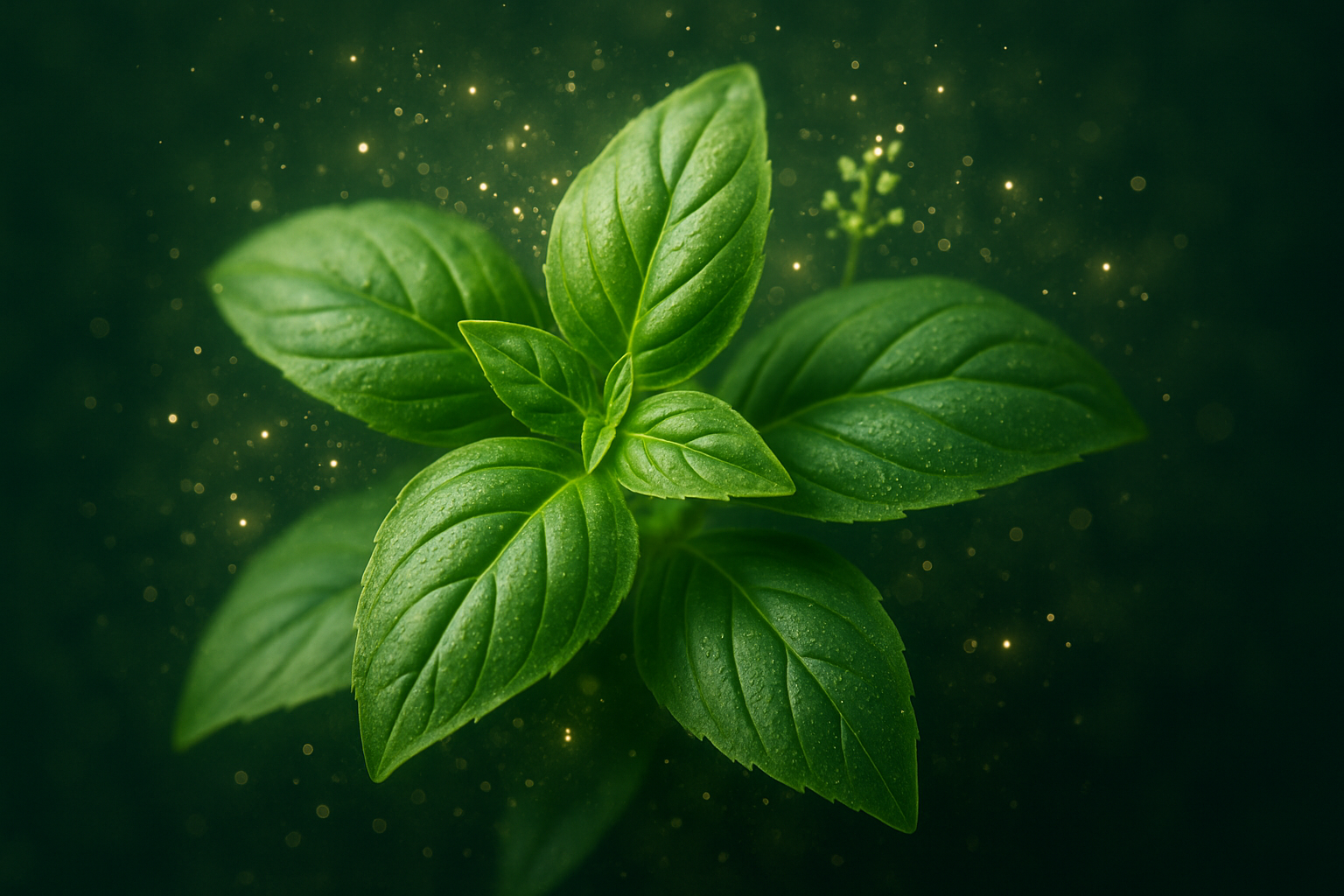
Basil tea is more than just a soothing herbal drink—it’s packed with nutrients and antioxidants that offer real health benefits. Basil leaves are rich in vitamins A, K, and C, essential minerals like calcium, iron, and magnesium, and powerful plant compounds such as eugenol, linalool, and rosmarinic acid.
When you steep fresh or dried basil leaves in hot water, many of these nutrients and antioxidants infuse into the tea. For example, water-soluble vitamins like vitamin C and some flavonoids transfer easily, while the volatile oils responsible for basil’s fragrance also carry over, contributing both aroma and health-supporting properties.
This means that a cup of basil tea delivers anti-inflammatory and immune-boosting effects, thanks to its antioxidant content. Eugenol can help reduce inflammation, while other phytochemicals act as natural stress relievers.
Real-world tip: use freshly boiled water and let the basil leaves steep for at least five minutes to maximize nutrient extraction. While tea won’t provide the same fiber or all fat-soluble vitamins as eating whole leaves, it’s an easy, tasty way to add a nutritional boost and a touch of herbal calm to your daily routine.
Scientifically Backed Health Benefits of Basil Tea
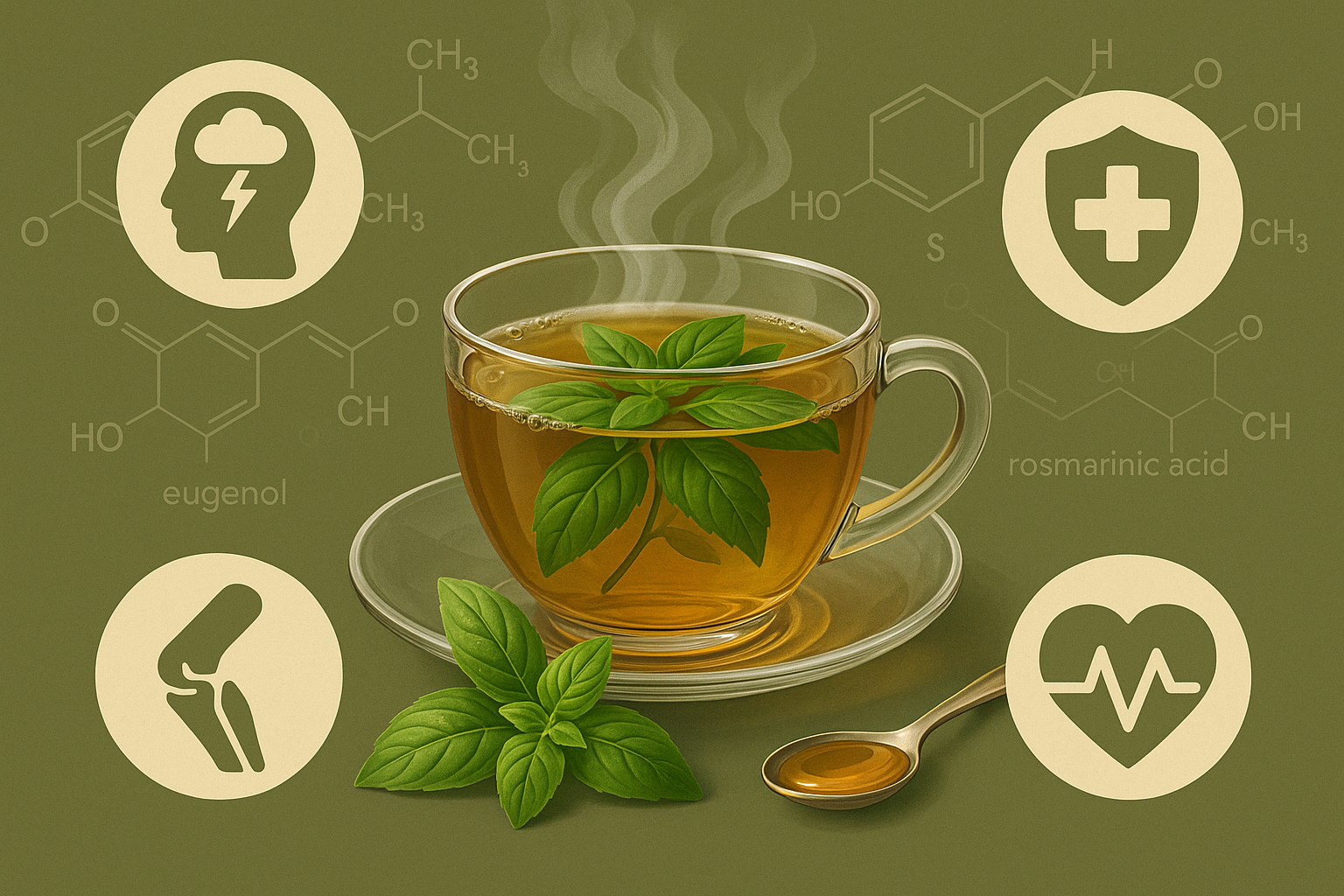
Basil tea, especially when brewed from holy basil (also known as tulsi), offers a range of impressive health benefits that are increasingly supported by scientific research. One of holy basil’s standout qualities is its adaptogenic effect, meaning it helps the body manage stress more effectively.
Several clinical studies have shown that regularly drinking tulsi tea can reduce stress levels, lower anxiety, and enhance mood—possibly by balancing cortisol (the stress hormone) and supporting the nervous system. For this reason, it’s commonly recommended for those feeling overwhelmed or mentally fatigued.
Beyond its stress-reducing capabilities, basil tea is rich in anti-inflammatory and antioxidant compounds, like eugenol and rosmarinic acid, which help protect cells from oxidative damage and reduce inflammation throughout the body. This is particularly beneficial for people with inflammatory conditions such as arthritis.
The immune-supportive properties of holy basil are well documented. For example, research has found that tulsi can enhance immune cell activity and even provide mild antimicrobial effects, making it a great sip during cold and flu season.
There’s also growing evidence that basil tea can help regulate blood sugar and cholesterol levels. Small human studies suggest that regular consumption may lower fasting blood sugar and improve overall cholesterol profiles by reducing LDL (“bad”) cholesterol and boosting HDL (“good”) cholesterol—though more large-scale trials are needed to confirm these effects for the wider population.
In addition to these core benefits, preliminary research hints that basil tea might aid digestion, support cardiovascular health, and promote clearer skin due to its natural detoxifying and antimicrobial properties.
However, it’s important to note that while the adaptogenic, anti-inflammatory, antioxidant, and immune-boosting effects are consistently validated by scientific studies, the benefits related to blood sugar, cholesterol, digestion, and skin health are promising but still require further high-quality research.
For anyone looking to naturally support their wellbeing, basil tea—especially holy basil—can make a tasty and restorative addition to daily routines. Just remember, it’s always best to use it alongside, not as a substitute for, evidence-based medical care.
Potential Risks and Considerations
When considering any new supplement or herbal remedy, certain groups need to be especially careful. Pregnant and breastfeeding women should consult a healthcare professional before taking herbs, as some ingredients may not be safe for developing babies or can be passed through breast milk.
People who take prescription medications—especially blood thinners, diabetes medications, or antidepressants—should be aware that herbs can interact with drugs, sometimes amplifying or reducing their effects. For example, St. John’s Wort can interfere with birth control pills or antidepressants, while licorice root may raise blood pressure or lower potassium.
Common side effects from some herbs include digestive discomfort, headaches, allergic reactions, or changes in blood pressure and heart rate. It’s also easy to assume “natural” ingredients are always safe, but that isn’t the case—dosage matters. Taking excessive amounts of certain herbs can lead to liver toxicity or other serious issues over time.
Even if you’re healthy, moderation is key, and it’s wise to keep your doctor informed about all supplements and herbs you use. This helps avoid unwanted interactions and ensures any health changes are appropriately monitored. When it comes to supplements, a little diligence goes a long way in protecting your well-being.
Tips for Enjoying Basil Tea Regularly
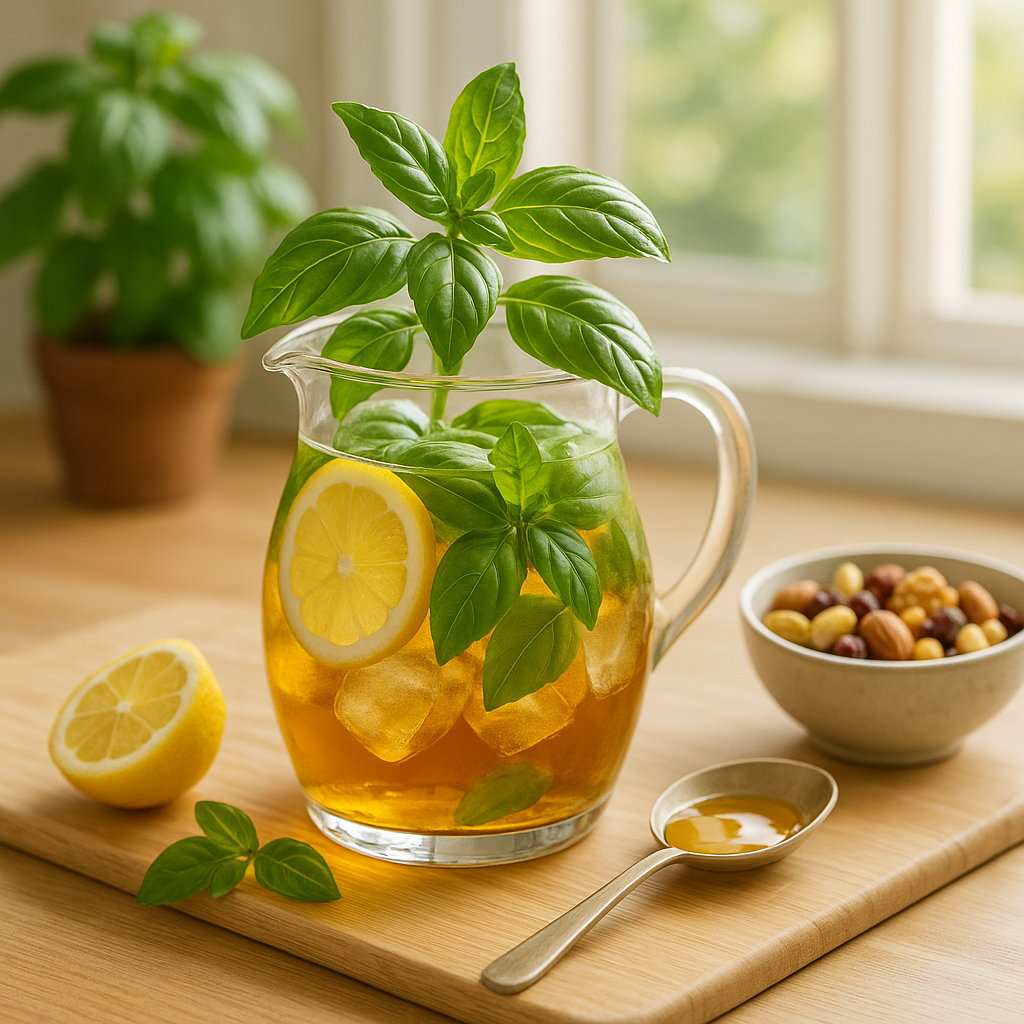
Making basil tea a regular part of your day is easy with a little planning and creativity. Try brewing a large batch in the morning and keeping it in the fridge, so you can enjoy a refreshing cup iced or warm anytime. This saves prep time and means healthy hydration is always within reach.
For a seamless routine, pair basil tea with your afternoon snack—its gentle, peppery notes complement light bites like rice crackers, fruit, or nut mixes.
Feeling adventurous? Mix in other herbs such as mint, lemongrass, or a splash of ginger for a flavor boost. You can also swap sweeteners depending on your mood: honey adds warmth, while a twist of lemon brings zesty freshness.
For convenient storage, keep fresh basil leaves in the fridge wrapped in a damp paper towel or use dried basil stored in an airtight container. Pre-measure tea portions for the week into individual sachets, so your next infusion is practically ready to go.
The beauty of basil tea is its versatility; experiment with fruit slices or different teas like green or black for new tastes. Making it your own means you’ll look forward to your daily cup, savoring both the ritual and the flavor variety.
Conclusion
Basil tea is incredibly easy to make, requiring only fresh basil leaves and hot water, yet it offers a wide range of benefits—from calming stress to aiding digestion. Trying it at home can be a simple, relaxing ritual that fits into any busy schedule. Experimenting with flavors like honey or lemon makes it even more enjoyable.
Why not brew a cup today and see how it makes you feel? Remember, everyone’s body is different, so listen to yours and consult a healthcare professional if you have any health concerns or questions about adding basil tea to your routine.
